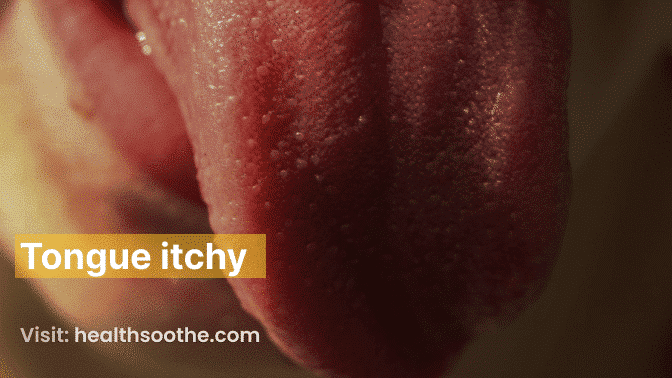Have you ever experienced an itchy tongue? While it may not be the most common ailment, an itchy tongue can be both uncomfortable and concerning. There are several potential causes of tongue itching, ranging from mild to serious medical conditions. In this article, we’ll explore the meaning of tongue itching, the various causes of tongue itching and provide tips on how to manage and prevent it.
What is Tongue Itching
Tongue itching is an uncomfortable sensation that can occur on the surface of the tongue. It can be caused by a variety of factors, including allergic reactions, infections, dry mouth, and certain medical conditions. Tongue itching can be accompanied by other symptoms such as pain, burning, or swelling. While it is usually not a cause for concern, persistent or worsening tongue itching may require medical attention. Treatment for tongue itching typically involves addressing the underlying cause and managing symptoms with home remedies or over-the-counter medications.
Read Also: How to Order Artvigil Online in the USA 2023?
Causes of Tongue Itching
There are numerous causes of tongue itching, ranging from mild to serious conditions. Some of the most common causes include:
- Allergic Reactions: An allergic reaction can cause an itchy tongue, especially if you consume foods that you are allergic to. This condition is known as oral allergy syndrome. It typically occurs when the immune system overreacts to certain proteins in fruits, vegetables, or nuts. The symptoms of oral allergy syndrome can range from mild to severe and include itching, swelling, and even anaphylaxis.
- Medical Conditions: Several medical conditions can cause an itchy tongue, including geographic tongue and oral thrush. Geographic tongue is a harmless condition that causes white patches on the tongue, leading to an itchy sensation. Oral thrush is a fungal infection that can occur in the mouth, causing white lesions on the tongue, gums, and cheeks.
- Burning Mouth Syndrome: Burning mouth syndrome is a chronic condition that causes a burning sensation on the tongue, lips, and mouth. This condition can also cause an itchy tongue, along with a metallic taste, dry mouth, and sore throat.
Home Remedies and Treatments for Tongue Itching
Fortunately, there are several home remedies and treatments available to help manage and prevent tongue itching. Some of the most effective methods include:
- Avoiding Triggers: If your tongue itching is caused by an allergic reaction, it is essential to identify and avoid your triggers. This may include avoiding certain foods or medications.
- Maintaining Oral Hygiene: Maintaining good oral hygiene can help prevent fungal infections like oral thrush. This includes brushing your teeth twice a day, flossing, and using mouthwash.
- Using Over-the-Counter Medications: Over-the-counter antihistamines and pain relievers can help alleviate symptoms of tongue itching caused by allergies or inflammation.
- Prescription Medications: If your tongue itching is caused by a medical condition, prescription medications may be necessary to treat the underlying condition. For example, antifungal medications can be used to treat oral thrush.
Prevention and Management of Tongue Itching
In addition to treating tongue itching, it is also essential to take steps to prevent it. Some tips for preventing tongue itching include:
- Avoiding Triggers: As mentioned earlier, avoiding triggers like certain foods or medications can help prevent tongue itching caused by an allergic reaction.
- Maintaining Oral Hygiene: Practicing good oral hygiene, such as brushing and flossing regularly, can help prevent fungal infections that can cause tongue itching.
- Managing Stress: Stress can weaken the immune system and make you more susceptible to infections and other medical conditions. Finding healthy ways to manage stress, such as through exercise or meditation, can help prevent tongue itching.
- Quit Smoking: Smoking can irritate the tongue and make it more susceptible to infections and other medical conditions that can cause itching. Quitting smoking can help prevent tongue itching and improve overall oral health.
- Drink Plenty of Water: Staying hydrated can help prevent dry mouth, which can contribute to tongue itching. Aim to drink at least eight glasses of water per day to keep your mouth and tongue moist.
- Vitamin Deficiencies: A deficiency in certain vitamins, such as vitamin B12, can cause tongue itching. This is because these vitamins play a crucial role in maintaining healthy nerve function. If you suspect a vitamin deficiency may be causing your tongue itching, talk to your doctor about getting your vitamin levels checked.
- Side Effects of Medications: Certain medications can cause tongue itching as a side effect. This is especially true of medications that can cause an allergic reaction, such as antibiotics or pain relievers. If you suspect a medication may be causing your tongue itching, talk to your doctor about adjusting your dosage or switching to a different medication.
When to See a Doctor
While most cases of tongue itching can be managed with home remedies and over-the-counter medications, it is important to see a doctor if your symptoms persist or worsen. You should also seek medical attention if you experience additional symptoms, such as difficulty breathing or swallowing, or if you have a fever.
Conclusion
Tongue itching can be uncomfortable and concerning, but it is usually not a cause for alarm. In most cases, tongue itching can be managed with home remedies and over-the-counter medications. However, if your symptoms persist or worsen, or if you experience additional symptoms, it is important to see a doctor. By taking steps to prevent tongue itching and managing your symptoms when they occur, you can reduce your risk of developing more serious medical conditions.
Tongue itchy Q1: What are some possible causes of an itchy tongue?
A1: An itchy tongue can be caused by a variety of factors, including allergies, infections, and certain medications. In rare cases, it may be a sign of an underlying medical condition.
Q2: Can an itchy tongue be a symptom of an allergic reaction?
A2: Yes, an itchy tongue can be a symptom of an allergic reaction, especially if it is accompanied by other symptoms such as swelling, hives, or difficulty breathing.
Q3: How can an itchy tongue be treated?
A3: Treatment for an itchy tongue depends on the underlying cause. For allergies, antihistamines may be prescribed. For infections, antibiotics or antifungal medications may be necessary. In some cases, over-the-counter pain relievers may help alleviate discomfort.
Q4: When should I see a doctor about my itchy tongue?
A4: If your itchy tongue persists or is accompanied by other symptoms such as swelling or difficulty breathing, it is important to seek medical attention immediately. Additionally, if you have a history of allergies or any other medical conditions, it is important to consult with your doctor.
Q5: Are there any home remedies that can help alleviate an itchy tongue?
A5: While there is no guaranteed home remedy for an itchy tongue, some individuals have found relief by rinsing their mouth with salt water, applying a cold compress to the affected area, or avoiding foods that may be causing an allergic reaction.




